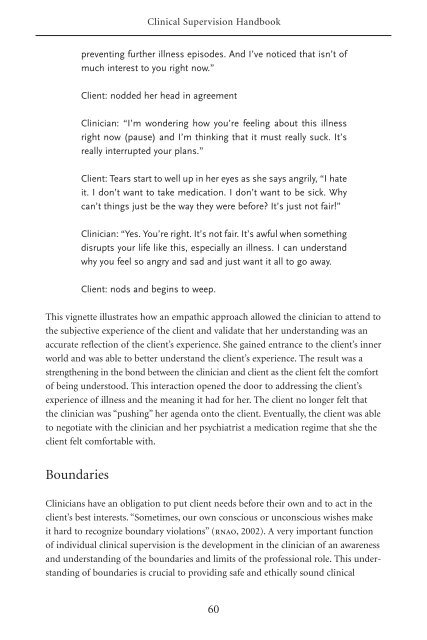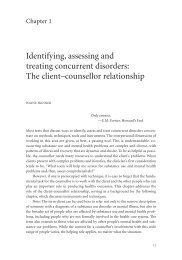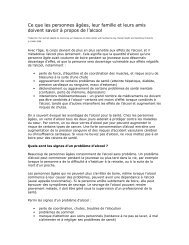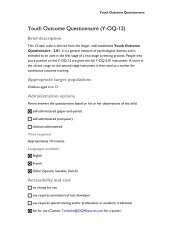Clinical Supervision Handbook - CAMH Knowledge Exchange ...
Clinical Supervision Handbook - CAMH Knowledge Exchange ...
Clinical Supervision Handbook - CAMH Knowledge Exchange ...
Create successful ePaper yourself
Turn your PDF publications into a flip-book with our unique Google optimized e-Paper software.
preventing further illness episodes. And I’ve noticed that isn’t of<br />
much interest to you right now.”<br />
Client: nodded her head in agreement<br />
Clinician: “I’m wondering how you’re feeling about this illness<br />
right now (pause) and I’m thinking that it must really suck. It’s<br />
really interrupted your plans.”<br />
Client: Tears start to well up in her eyes as she says angrily, “I hate<br />
it. I don’t want to take medication. I don’t want to be sick. Why<br />
can’t things just be the way they were before? It’s just not fair!”<br />
Clinician: “Yes. You’re right. It’s not fair. It’s awful when something<br />
disrupts your life like this, especially an illness. I can understand<br />
why you feel so angry and sad and just want it all to go away.<br />
Client: nods and begins to weep.<br />
This vignette illustrates how an empathic approach allowed the clinician to attend to<br />
the subjective experience of the client and validate that her understanding was an<br />
accurate reflection of the client’s experience. She gained entrance to the client’s inner<br />
world and was able to better understand the client’s experience. The result was a<br />
strengthening in the bond between the clinician and client as the client felt the comfort<br />
of being understood. This interaction opened the door to addressing the client’s<br />
experience of illness and the meaning it had for her. The client no longer felt that<br />
the clinician was “pushing” her agenda onto the client. Eventually, the client was able<br />
to negotiate with the clinician and her psychiatrist a medication regime that she the<br />
client felt comfortable with.<br />
Boundaries<br />
<strong>Clinical</strong> <strong>Supervision</strong> <strong>Handbook</strong><br />
Clinicians have an obligation to put client needs before their own and to act in the<br />
client’s best interests. “Sometimes, our own conscious or unconscious wishes make<br />
it hard to recognize boundary violations” (rnao, 2002). A very important function<br />
of individual clinical supervision is the development in the clinician of an awareness<br />
and understanding of the boundaries and limits of the professional role. This understanding<br />
of boundaries is crucial to providing safe and ethically sound clinical<br />
60

















